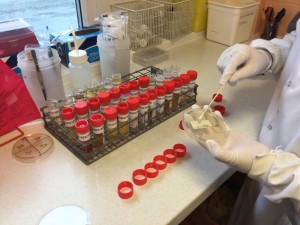 One of my lab scientists highlighted how a few years ago, when working in a smaller laboratory at a time when they were severely short staffed, they had to take the urgent decision to stop testing any urine sample that came into the laboratory without any clinical details.
One of my lab scientists highlighted how a few years ago, when working in a smaller laboratory at a time when they were severely short staffed, they had to take the urgent decision to stop testing any urine sample that came into the laboratory without any clinical details.
There was a two fold effect: the absolute numbers of urine samples arriving in the laboratory, prior to any being rejected for lack of clinical information reduced and secondly, the clinical information on those samples arriving improved dramatically.
Some time later, the staffing situation improved and the lab felt able to stop rejecting urine samples that contained inadequate detail. Over time, the number of samples increased again and the quality of the information decreased.
She told me this story as we had been discussing how we are operating in a complex adaptive system and how we are now actively persuing similar strategies in our move to influence infection coming into secondary care across the health board area.
As many readers will be aware, the Hywel Dda Health Board has adopted a new approach to the prevention of healthcare associated infection, that recognises that the infection we deal with is influence by the complex adaptive system that is the NHS. Yesterday, members of the infection control groups, which includes infection control nurses, antimicrobial pharmacists and microbiologists met at Ty Canol with a number of external partners, including Sion Charles from the Bevan Commission. Some will be aware that our programme has been selected by the Bevan Commission as an exemplar and we were delighted that Sion was able to help us by acting as one of the facilitators of the meeting.
We were also joined by Dr Mark Temple, from the Communicable Disease Surveillance Centre in Cardiff. He has been helping us with the analysis of our E. coli bacteraemia data from 2000 to 2015. Mark showed us that there is clear evidence of the increase over time of the E. coli bacteraemia but that by plotting on a statistical process control chart, that our system is not out of control, which offers some reassurance. However, our desire is to see the numbers of bacteraemia patients presenting in secondary care reduce over time. My simple analysis of the data for 2015 does show that the absolute numbers have gone back to the figure we had in 2013. Once we get to factor in sample numbers submitted and population basis, this may indicate that there has been a reduction but I think we will be very reliant on Mark working with us to demonstrate if this is the case. What was interesting from Marks presentation is that using the tools at his disposal, we may be able to map change over months, rather than years, which will be very helpful in assessing progress.
We are beginning to see some outcome effects with both our laboratory reporting practices and also in the introduction of new clinical practices e.g. the introduction of peripheral vascular device insertion packs and reduction in canulae associated infection. We spent some of the morning considering what other triggers we could find that will influence the system in a positive way and reduce risks of infection. These conversations will be continuing internally and with our partners and I will aim to share these as they develop and bear fruit
Leave a Reply